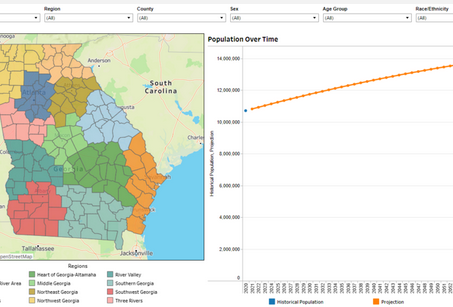
ATLANTA – Georgians now have easier access to information about their government, thanks to a small-but-mighty team working behind the scenes to present data to the public.
The Georgia Data Analytics Center (GDAC) was founded in 2019 under the auspices of the Office of Planning and Budget.
“We’re currently able to capture and analyze amounts of data that were unthinkable just a decade ago,” Kanti Chalasani, the director of the center, said.
The GDAC website features “data dashboards” that take complex data from state agencies and put it into simple charts, graphs, and maps.
“We want to give this data to people, to public entities who are wanting to serve their constituents,” Chalasani explained during a recent presentation to the Behavioral Health Reform and Innovation Commission.
The interactive dashboards help Georgians get a big-picture look at a topic or zero in on specific aspects of the data they find most interesting.
The state employee salary dashboard has been the most popular feature so far, Chalasani said.
Georgians might also be interested in how the state allocates its budget or how their county’s population might change in the future.
Right now, GDAC is focusing on health-care data, Chalasani said. It has posted data about Medicaid health care quality outcomes and pharmaceutical drug costs for state health plan and Medicaid enrollees.
The center anonymizes all the data and has a strong security structure in place to protect the data, Chalasani said.
Chalasani has been a Georgia employee for 25 years; this is her fifth big data project for the state.
“I live and breathe data,” she told the behavioral health reform commission.
Her five-person team has collected and published a wide variety of state data in a short timeframe.
Once the team receives a dataset from a state agency, it only takes between three weeks and three months to process the data into the interactive dashboards, Chalasani said.
The center was named “State IT Innovation of the Year” for 2022 by StateScoop, a news outlet that reports on technology in state government.
“We built a tiger team, with an assembly line of activities and an efficient data pipeline,” Chalasani said of her approach. “Our team is sincere and driven.”
“[The] biggest challenge is to convince our state agencies to share their data with GDAC and to establish a data sharing agreement with them,” Chalasani said.
Chalasani and her team are eager to continue serving up information about state government to Georgians.
“Our cooking station is ready: just give us the data,” she emphasized.
This story is available through a news partnership with Capitol Beat News Service, a project of the Georgia Press Educational Foundation.